________________
Vol. XXX, 2006
THE CONCEPT OF KAMMA IN BUDDHISM :
other hand if a man speaks or acts with a pure thought happiness follows him in consequence like a shadow that never leaves him.28' It means, according to Buddhism vedanā - sensation, samjñā - conception and samskāra - aggregation, these three śkandhas are collectively termed as Dhamma. These are the result of vijñāna - conciousness, which is called manas-citta. All these three are dominated by mind, governed by it, and made up of it. Here the mind is used in the sense of the whole content of consciousness. Manas in the sense of vijñāna is the active thinking principle. Mental state of the mind of an individual becomes cause of pleasure and pain. Indeed, the Buddha has analysed the internal and spiritual part of a personality keeping the mind in the centre. There is great influence of thought on life of an individual and society. All that we are is the result of what we have thought. In one sense it is true that we live in a world of hard facts, but in a more important sense we live in a world of thoughts. By changing our thoughts we change our life and indirectly we change the character of the world. 29
These are also called the roots of the goodness - kusalakamma and roots of evil deeds - akusalakamma. All covetousness etc. are roots of evils or causes of evils. It means these are the basic causes of all kinds of evil deeds. In the same manner, all freedom from covetousness etc. are ground work of merit or cause of ground work of merit, and basic causes of all types of good deeds of actions. Besides good or evil minds there is one more kind - avyākata-citta.30 It means indefinite mind - an elementary substance from which all things were created. In this mind, rūpa - four elements earth etc. and the whole universe based on them are included.31 The activities formed by four elements are causeless. It means in these formation the causes of covetousness, anger and ignorance are not included. In the same manner, the inherent property, beyond the six causes desire etc. of mind, and all activities impelled by inherent inclinations are included in the category of indefinite mind. This state of mind is considered indefinite or indeterminate mind - vyākata-citta. All nitya karma - usual acts and naimitya karma - occasional acts are included under this category. Thus, the Buddhist theory is absolutely psychological one as earlier stated that all activities of human being begins from the merely mental state of mind. If the mind of an individual is not good then his conduct will not be good and as a consequence the life will be painful. The mind of an individual is fickle and difficult to control, it wanders at will. It means that an individual whose mind is not restraint enriches affection, attachment, thirst and passion and again becomes




